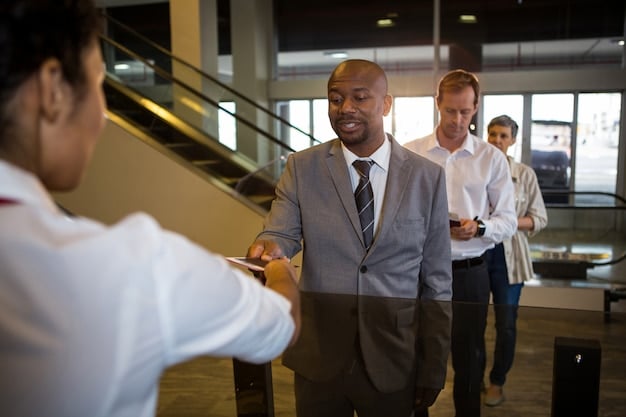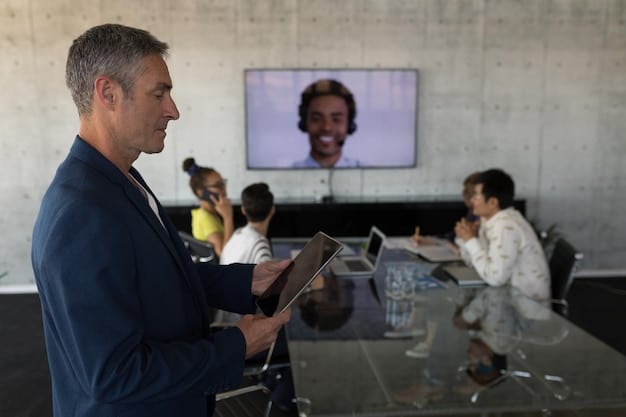US Diplomats’ Challenges in 2025: An Inside Foreign Service Look

Advertisements
The evolving global landscape in 2025 presents significant hurdles for US diplomats, requiring adaptability and strategic foresight to navigate complex geopolitical shifts, technological advancements, and persistent traditional rivalries. Addressing these multifaceted challenges will be crucial for maintaining American influence abroad and fostering international stability.
Advertisements
As the world hurtles towards 2025, the role of US diplomats grows more intricate and demanding. These dedicated professionals, often working behind the scenes, are at the forefront of America’s engagement with a rapidly shifting international order, facing a myriad of complex challenges that test their resolve, expertise, and adaptability. What exactly awaits them on this dynamic global stage?
The Evolving Geopolitical Landscape: Shifting Alliances and New Powers
The geopolitical contours of 2025 are anything but static, presenting a complex tapestry of shifting alliances, emergent powers, and persistent hotspots. US diplomats must navigate this intricate environment, where traditional partnerships are being re-evaluated and new strategic alignments are forged.
Advertisements
The rise of non-state actors, the increasing assertiveness of revisionist powers, and the fragmentation of established international norms all contribute to a highly unpredictable operational arena. Diplomats are continually challenged to maintain relevance and influence in forums that are becoming increasingly crowded and vociferous.
Responding to Multipolarity
The transition from a unipolar to a multipolar world order is arguably one of the most profound shifts shaping diplomatic efforts. This requires a nuanced understanding of diverse national interests and the capacity to engage meaningfully with multiple centers of power. It’s no longer just about bilateral relations but about intricate webs of multilateral engagement.
- Diversified Engagement: Cultivating relationships beyond traditional allies to address shared global concerns.
- Strategic Patience: Employing long-term diplomatic strategies that account for slower, more deliberate shifts in power dynamics.
- Flexible Frameworks: Developing adaptable diplomatic frameworks that can accommodate diverse perspectives and values.
This multipolar reality demands that diplomats possess not only deep regional expertise but also a comprehensive understanding of global trends, including economic interdependence, technological disruption, and environmental pressures, all of which influence international relations.
The Resurgence of Great Power Competition
While the focus is often on emerging threats, the resurgence of great power competition remains a formidable challenge. The United States continues to contend with strategic rivals who seek to challenge the existing international order and expand their spheres of influence. This competition plays out across various domains—economic, technological, informational, and military.
Diplomats are tasked with safeguarding national interests and promoting democratic values while avoiding escalation. This delicate balancing act involves both robust deterrence and open channels of communication, ensuring that lines of understanding remain available even amidst profound disagreement.
Ultimately, navigating the evolving geopolitical landscape requires a blend of astute analysis, strategic communication, and an unwavering commitment to the principles of diplomacy. The ability to forecast trends, identify opportunities for cooperation, and mitigate potential conflicts will be paramount for US diplomatic success in 2025.
Technological Disruption and Cyber Diplomacy: A New Frontier
The rapid pace of technological innovation is fundamentally reshaping the practice of diplomacy. From artificial intelligence and quantum computing to the pervasive influence of social media, technology presents both unprecedented opportunities and significant challenges for US diplomats in 2025. Effectively navigating this new frontier requires a blend of technical literacy and traditional diplomatic acumen.
Cybersecurity threats, in particular, loom large. State-sponsored cyberattacks, disinformation campaigns, and cyber espionage pose direct threats to national security, economic stability, and democratic processes. Diplomats are increasingly engaged in discussions around international norms for cyberspace, the attribution of attacks, and the development of collective responses to malicious cyber activity.
The Rise of AI in Diplomacy
Artificial intelligence is not just a tool for analysis; it’s becoming an integral part of how information is processed and, potentially, how diplomatic engagements are framed. While AI can enhance data analysis, predict trends, and even assist in language translation, it also introduces ethical dilemmas and concerns about algorithmic bias. Diplomats will need to understand AI’s capabilities and limitations to leverage its benefits while mitigating risks.
- Data-driven Decision Making: Using AI to analyze vast datasets for more informed policy formulation.
- Enhanced Communication: Employing AI-powered tools for real-time translation and sentiment analysis during negotiations.
- Ethical Governance: Participating in international dialogues to establish norms and regulations for AI’s use in global affairs.
Successfully integrating AI into diplomatic workflows while addressing its ethical implications will be a defining challenge for Foreign Service personnel.
Combating Disinformation and Enhancing Digital Trust
The proliferation of disinformation and misinformation online is a direct assault on the integrity of diplomatic engagement and public perception. Foreign entities increasingly weaponize information to sow discord, undermine trust in institutions, and influence public opinion. Diplomats are on the front lines of this information war, tasked with countering false narratives and promoting accurate reporting.
This involves not only reactive measures but also proactive strategies to build digital trust and foster media literacy abroad. It means engaging directly with online communities, leveraging digital platforms for public diplomacy, and collaborating with international partners to safeguard the information environment. This is a continuous battle, demanding constant vigilance and innovative communication strategies.
The intersection of technology and diplomacy requires a workforce that is not only adept at traditional statecraft but also proficient in digital tools, cybersecurity principles, and the nuances of online engagement. Adapting to this technologically driven landscape is crucial for maintaining diplomatic effectiveness.
Global Health Crises and Climate Diplomacy: Interconnected Threats
The lessons from recent global health crises underscore an undeniable truth: national borders offer little protection against biological threats. Similarly, the relentless progression of climate change continues to pose existential risks to every nation. For US diplomats in 2025, these interconnected global challenges demand unprecedented levels of international cooperation, resource mobilization, and strategic foresight.
Diplomacy in this context is no longer solely about traditional state-to-state relations; it’s about building intricate networks of public health experts, scientists, humanitarian organizations, and international bodies to forge collective responses. Climate diplomacy, in particular, involves complex negotiations over emission reductions, financial mechanisms for adaptation, and technological transfers, often pitting national economic interests against global environmental imperatives.
Strengthening Global Health Security
Preventing and responding to future pandemics requires robust international health security frameworks. Diplomats are crucial in negotiating and implementing agreements that facilitate rapid information sharing, equitable vaccine distribution, and coordinated research efforts. This often involves navigating sovereignty concerns and securing commitments from diverse states, each with their own capacities and priorities.

- Pandemic Preparedness: Advocating for increased investment in global surveillance systems and rapid-response mechanisms.
- Vaccine Equity: Promoting fair and transparent allocation of medical resources during health emergencies.
- Research Collaboration: Facilitating cross-border scientific partnerships to accelerate breakthroughs in disease prevention and treatment.
The ability to foster trust and shared responsibility in moments of crisis is a cornerstone of this diplomatic effort, demanding both empathy and strategic persuasion.
Accelerating Climate Action through Diplomacy
Climate change remains a top priority, and diplomatic efforts are vital for accelerating global action. This means working with nations at all stages of development to meet ambitious climate goals, transitioning to cleaner energy sources, and building resilience against extreme weather events. The challenges include securing commitments from major emitters, addressing the needs of vulnerable island nations, and ensuring that climate finance reaches those who need it most.
Diplomats engage in multilateral forums, bilateral discussions, and public diplomacy campaigns to raise awareness and galvanize political will. It’s about finding common ground, fostering innovation, and demonstrating the economic and security benefits of a sustainable future. The urgency of the climate crisis means that diplomatic progress must be both substantial and swift, requiring persistence and creative solutions.
Addressing global health and climate crises requires a holistic diplomatic approach that integrates scientific understanding, economic realities, and political will. The success of these efforts will define the well-being and security of future generations.
Economic Statecraft and Supply Chain Resilience: Safeguarding Prosperity
In an increasingly interconnected yet fragile global economy, economic statecraft has risen to prominence as a critical tool for US diplomats. Safeguarding national prosperity and ensuring the resilience of global supply chains are paramount concerns in 2025. This involves navigating complex trade disputes, promoting equitable economic practices, and mitigating vulnerabilities that could disrupt essential goods and services.
The weaponization of economic interdependence, the rise of protectionist sentiments, and the ongoing impact of geopolitical tensions on global trade routes all contribute to an environment where economic diplomacy is more challenging than ever. Diplomats are tasked with fostering open markets while protecting strategic industries and ensuring fair competition.
Navigating Trade Tensions and Promoting Fair Practices
Trade relations are often fraught with tension, driven by national interests, subsidies, and differing regulatory environments. US diplomats are continuously engaged in negotiations to resolve disputes, enforce trade agreements, and advocate for American businesses abroad. This requires a deep understanding of international trade law, economic policies, and the political economy of various nations.
The goal is not only to open markets but also to ensure a level playing field, where intellectual property is protected and all parties adhere to agreed-upon norms. This delicate balancing act aims to foster global economic growth while safeguarding American jobs and innovation.
Building Resilient Supply Chains
Recent disruptions, from pandemics to natural disasters and geopolitical conflicts, have exposed the fragility of global supply chains. Ensuring access to critical goods, from semiconductors to pharmaceuticals, has become a national security imperative. Diplomats play a key role in diversifying supply sources, fostering international cooperation on critical infrastructure, and reducing dependencies on single points of failure.
- Strategic Stockpiling: Advocating for international coordination on reserves of essential goods.
- Diversification Efforts: Encouraging companies to spread production across multiple countries to mitigate risks.
- Early Warning Systems: Collaborating on intelligence sharing to identify potential supply chain disruptions proactively.
This involves working closely with the private sector, international organizations, and foreign governments to build robust and adaptable global networks. The future of economic stability hinges on the ability to anticipate and withstand shocks to the global economy, making supply chain resilience a central pillar of modern diplomacy.
Human Rights, Democracy, and Humanitarian Aid: Upholding Values
The promotion of human rights and democratic values has long been a core tenet of US foreign policy. In 2025, amidst rising authoritarianism, democratic backsliding, and persistent humanitarian crises, this commitment faces renewed tests. US diplomats are critical in championing these values, providing aid, and advocating for the protection of vulnerable populations globally.
The challenge lies in balancing these moral imperatives with strategic interests and the realities of geopolitical competition. It requires sensitive engagement, robust advocacy, and the ability to build broad coalitions in support of fundamental freedoms and human dignity, often in environments where these values are actively suppressed.
Combating Democratic Backsliding
In many regions, democratic institutions are under threat, with governments eroding civil liberties, suppressing dissent, and undermining electoral processes. US diplomats are tasked with supporting democratic transitions, strengthening civil society, and empowering independent media. This involves subtle and firm diplomatic pressure, coupled with assistance programs aimed at fostering governance and accountability.

The goal is to ensure that the voices of citizens are heard and that the principles of representative government are upheld. This often requires navigating complex political landscapes and facing accusations of interference.
Addressing Humanitarian Emergencies
Conflicts, natural disasters, and economic instability continue to drive unprecedented humanitarian crises, displacing millions and creating urgent needs for food, shelter, and medical care. US diplomats are vital in coordinating international aid efforts, ensuring access for humanitarian organizations, and advocating for an end to hostilities that fuel suffering.
- Access Negotiation: Securing safe passage for aid convoys and humanitarian workers in conflict zones.
- Resource Mobilization: Urging international donors to contribute to emergency relief efforts.
- Protection of Civilians: Advocating for adherence to international humanitarian law and the safeguarding of human lives.
This aspect of diplomacy is intensely personal, requiring empathy, resilience, and a deep commitment to alleviating human suffering. It is a constant reminder of the human cost of global instability and the essential role of diplomacy in providing relief.
Personnel and Resource Constraints: The Internal Challenges
Beyond the external pressures shaping global affairs, US diplomats also contend with significant internal challenges related to personnel, resources, and institutional adaptability. The effectiveness of the Foreign Service in 2025 is inextricably linked to its internal health, including recruitment, training, morale, and funding. These factors directly impact America’s ability to project influence and pursue its interests worldwide.
Budgetary uncertainties, rapid personnel turnover in key positions, and the need for new skill sets (e.g., in cyber and AI diplomacy) all create hurdles. Maintaining a highly skilled, diverse, and resilient diplomatic workforce requires continuous investment and strategic planning, ensuring that the right people are in the right places with the right tools.
Recruiting and Retaining Top Talent
Attracting and retaining the best and brightest to the Foreign Service is an ongoing challenge. The demands of diplomatic life, often involving frequent relocation, separation from family, and work in high-threat environments, can be deterrents. Ensuring that the Foreign Service reflects the diversity of the United States is also crucial for effective engagement with a global population.
Efforts must focus on competitive compensation, robust professional development, and creating a supportive environment that values diverse perspectives and experiences. Without a strong pipeline of talent, the US risks losing its competitive edge in global diplomacy. This involves outreach to academic institutions, fostering mentorship programs, and continuously assessing the needs of the modern diplomat.
Adapting to Budgetary Realities
Diplomacy, while often seen as a cost-effective alternative to military intervention, requires consistent funding. Budgetary constraints can limit the number of diplomatic posts, reduce essential programs, and restrict mobility, ultimately diminishing the US’s global presence and responsiveness. Diplomats frequently operate under strict financial limitations, impacting their ability to travel, engage with local populations, and execute initiatives.
- Efficient Resource Allocation: Prioritizing funding to maximize impact in key strategic areas.
- Partnerships with NGOs and Private Sector: Leveraging external resources to augment diplomatic efforts.
- Advocacy for Diplomatic Funding: Educating policymakers about the long-term value and cost-effectiveness of diplomatic engagement.
Navigating these financial realities while maintaining high operational standards is a continuous balancing act. Sustainable funding is not just about overhead; it’s about investing in the networks and relationships that underpin global security and prosperity. Achieving strategic diplomatic goals in 2025 necessitates adequate and predictable financial support.
| Key Challenge | Brief Description |
|---|---|
| 🌎 Shifting Geopolitics | Navigating new power centers and evolving alliances in a multipolar world. |
| 💻 Tech & Cyber Threats | Addressing AI implications, disinformation, and cybersecurity in diplomatic efforts. |
| 🌡️ Health & Climate | Fostering collaboration on global health security and climate action. |
| ⚖️ Resource Limitations | Managing budget constraints and talent retention within the Foreign Service. |
Frequently Asked Questions About US Diplomacy in 2025
▼
AI is expected to significantly influence diplomatic negotiations by providing enhanced data analysis, predictive insights, and real-time translation. This can lead to more informed decision-making and efficient communication. However, it also raises concerns about data privacy, algorithmic bias, and the need for ethical guidelines in its application for statecraft.
▼
The most pressing geopolitical challenge is navigating the shift to a multipolar world order coupled with the resurgence of great power competition. This involves balancing engagement with emerging powers while managing strategic rivalries, ensuring American interests are protected without escalating tensions, and adapting to a more fragmented international system.
▼
Climate change and global health crises are deeply interconnected, as environmental degradation can exacerbate health vulnerabilities and lead to new disease vectors. Diplomats address them through joint initiatives promoting sustainable development, enhancing global health security frameworks, and mobilizing resources for adaptation and resilience, emphasizing their shared global impact.
▼
US diplomats work to strengthen global supply chain resilience by fostering international cooperation, diversifying sourcing, and negotiating agreements that promote open and secure trade routes. They engage with foreign governments and the private sector to identify vulnerabilities and implement strategies to prevent disruptions, ensuring continued access to critical goods.
▼
Enhancing diversity and retaining top talent is crucial for the Foreign Service because a diverse workforce brings varied perspectives and experiences, essential for understanding and engaging with a complex global landscape. Retaining skilled professionals ensures institutional knowledge and expertise are maintained, strengthening the diplomatic corps’ effectiveness and adaptability in a rapidly changing world.
Conclusion
The challenges confronting US diplomats in 2025 are formidable and multifaceted, spanning geopolitical shifts, technological disruption, global crises, and internal resource constraints. Yet, these very challenges underscore the indispensable value of skilled diplomacy. The ability of the US Foreign Service to adapt, innovate, and strategically engage will be paramount to safeguarding American interests, promoting stability, and shaping a more secure and prosperous global future. Their success hinges on robust investment in their capabilities and an unwavering commitment to the principles of proactive engagement and collaborative problem-solving on the world stage.